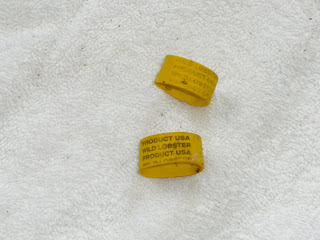Still, just as with pottery shards, coins, nails, and other "small finds" at an archaeological dig, this modern trash is evidence. And it has a story to tell; it's just a question of learning how to read it.
So a little more detail about the bag collected on March 19.
Some things don't take much detective work -- such as the remnants of somebody's trip to Dairy Queen.
But some things do.
132 of these rubber-bandy things in my first bag. 31 here in this bag. What on earth? Well, there was a big clue in the huge amount of trawler rope and broken traps from commercial fishing fleets. Plus, I remembered many trips to Hannaford's, with my daughter waving hi to all the lobsters scrunched in their tank. Their claws were tightly banded so they wouldn't snap and maul or murder each other.
And if there were any doubt left, a clean-up of my finds revealed:
It's not hard to picture the scene. Lobster boat crew racing to get the bands on their newly-hauled catch. It's a dangerous job. A lobster pinch can tear the flesh off of a finger, and even badly bruise a gloved hand. Not to mention lobsters wounding each other and rendering the catch worthless.
It's also not hard to picture hundreds -- thousands -- of these little bands going overboard. Who would give a second thought to a little rubber band? Just grab another one. They're sold in bulk, all over the world. (How many bands -do- you get for a 25 lb. carton?) If you Google "lobster bands" you get some 2,840 hits. It's a big business.
Sadly, as I was learning with my beach-combing, these lost bands don't sink to the bottom of the ocean, to be covered by sediment and become future fossils. They don't melt into nothing, disappearing back from where they came. They simply don't go away.



No comments:
Post a Comment